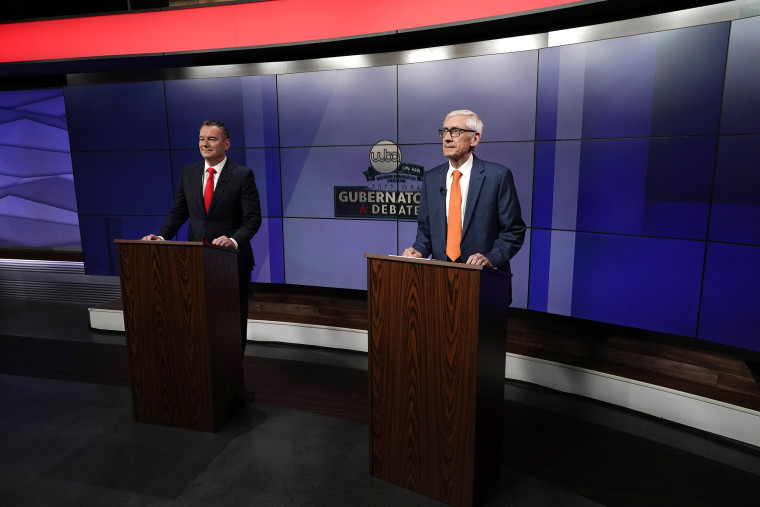MADISON, Wis. — Wisconsin Democratic Gov. Tony Evers and his Republican challenger, Tim Michels, clashed on crime, guns and abortion during their only debate Friday night, making it clear at every turn that their positions on critical issues affecting the state couldn’t be further apart.
The race between Evers and Michels, whose family owns a successful construction company, is likely to be one of the closest contests in the country and will have major implications for abortion rights and education, as well as elections.
While Friday night’s debate was entirely civil, the two candidates displayed the clear differences between them on major issues.
On abortion rights, Michels reiterated he would support an abortion ban that includes exceptions for pregnancies resulting from rape or incest — a shift from his earlier stance on the issue. Until last month, when Michels changed his position, he had firmly supported an 1849 state law banning abortion in almost all cases that went back into effect after the U.S. Supreme Court overturned Roe v. Wade in June.
“I am pro-life and I make no apologies for that,” Michels said Friday. He said he was not against contraception but avoided directly answering a question about whether he would, as governor, attempt to stand in the way of — or punish — Wisconsin women seeking abortion care out of state.
That last topic, Michels said, was “something we’ll have to sit down and work out,” but he added that he was “not going to be this radical guy with checks at the border.”
Evers, for his part, said “women should have the ability and the right to make decisions about their health care, including their reproductive health care, and that includes abortion.” He called Michels “radical on this issue.”
On crime, Michels vowed he would “provide bold leadership and get crime down” and would “make sure law enforcement has the funds needed.” Michels did not provide any specifics behind a plan to accomplish those goals, but said he was “going to talk to the bad guys, if you will, on election night” if he wins and tell them “if they’re not willing to do the time, they shouldn’t do the crime.”
Evers said combating crime “isn’t just about talking tough” but is “about providing the resources so that those police officers can do the job.”
On guns, Evers reiterated his support for universal background checks and "red-flag" laws that remove firearms from those believed to be a danger to themselves or others, while Michels complained that the “left always just wants to take away guns.”
Michels slammed red-flag laws as “unconstitutional” and “a slippery slope” and expressed his belief that “without due process,” such laws would result in guns being “confiscated” from law-abiding individuals.
Evers responded by saying “responsible gun owners don’t have to worry about red-flag laws.”
The two also offered starkly different responses when asked if they believed the 2020 election in the state had been rife with fraud — a debunked claim that has been falsely repeated by former President Donald Trump.
Michels claimed “illegal voting did happen in the last election” despite no evidence widespread fraud occurred.
Evers, on the other hand, plainly stated that “the last election was safe and secure and there was not fraud.”
“The reason that people are concerned about it is we have people like my opponent who continue to talk about massive fraud without having any idea or any specifics,” he said.
Throughout the Republican primary race, Michels repeatedly said there was fraud in the 2020 election, echoing Trump’s disproven claims. While he waffled at times, Michels also said during the primary that he was open to efforts to decertify Biden’s win in the state, even though there is no legal vehicle under state or federal law to rescind a state’s electoral votes.
In one rare moment of agreement on Friday night, both men committed to accepting the results of the election.
The 60-minute face-off, held at a television studio in Madison, was the only debate between the two candidates before the Nov. 8 election.
Evers and Michels are locked in a tight race. RealClearPolitics' latest polling average showed the race tied at about 48% support for each candidate. The latest Marquette Law School poll, released Wednesday, showed Evers slightly leading Michels among likely voters, 47% to 46% — within the margin of error. The nonpartisan Cook Political Report rates the race as a toss up.
The pivotal battleground of Wisconsin is among the states where Biden had his narrowest victories in 2020, winning by fewer than 21,000 votes. In 2018, Evers beat Republican Gov. Scott Walker by fewer than 30,000 votes.

